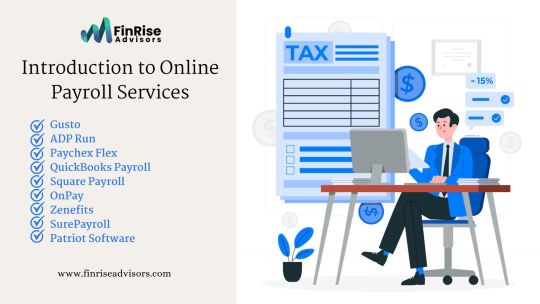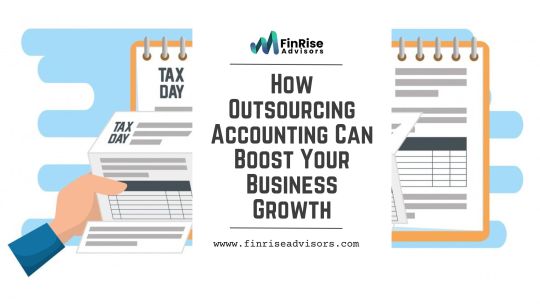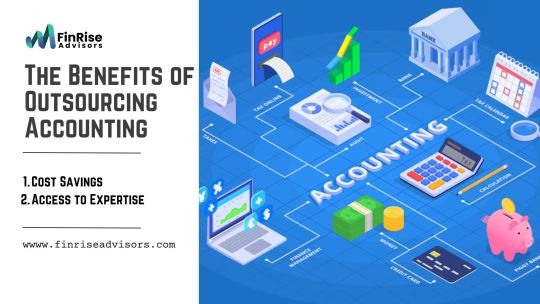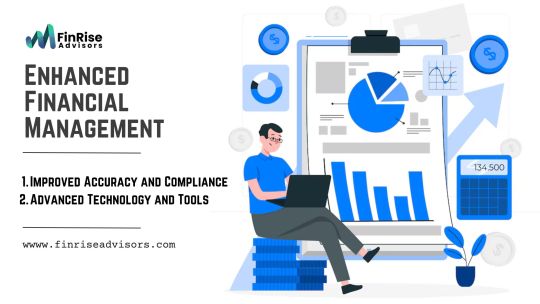FinRise Advisers online platform makes tax filing in India easier. Quick income tax return ITR filing services with knowledgeable support from professionals with expertise. We shorten the procedure, guaranteeing loyalty to tax laws and optimizing refunds or savings. Tax season is less stressful because to our user-friendly service, which assists both people and businesses in easily navigating tax laws. For dependable, precise, and convenient tax filing solutions that are customized to meet your needs, trust FinRise Advisers.
Don't wanna be here? Send us removal request.
Text
How Offshore Accounting & Taxation Can Benefit Your Business
In today’s globalized economy, businesses are increasingly looking beyond their national borders to optimize their operations and maximize profits. One strategy that has gained significant traction is the use of offshore accounting and taxation services. By understanding how Offshore Accounting and Taxation can benefit your business, you can make informed decisions that support your growth and financial health.
Understanding Offshore Accounting and Taxation

The Benefits of Offshore Accounting and Taxation
1. Tax Optimization
One of the primary reasons businesses engage in offshore accounting and taxation is to optimize their tax obligations. Many jurisdictions offer lower tax rates, tax holidays, or incentives for foreign businesses. By leveraging these benefits, companies can significantly reduce their overall tax burden.
Offshore tax preparation plays a crucial role here. Skilled professionals in offshore jurisdictions understand local tax laws and can navigate complex regulations to ensure compliance while maximizing deductions and credits. This strategic approach to taxation can lead to substantial savings, allowing businesses to reinvest in growth.
2. Enhanced Financial Privacy
In an age where data breaches and financial scrutiny are prevalent, many businesses seek greater privacy for their financial dealings. Offshore Accounting and Taxation Services often provide enhanced confidentiality, protecting sensitive information from public disclosure.
This financial privacy can be especially beneficial for high-net-worth individuals or companies dealing in competitive industries. By using offshore accounting services, businesses can ensure their financial strategies remain confidential, safeguarding their competitive advantage.
3. Access to Specialized Expertise
Offshore accounting firms often employ professionals with specialized knowledge in international tax laws and financial management. This expertise can be invaluable for businesses operating in multiple countries or engaging in cross-border transactions.
By utilizing offshore accounting and taxation services, businesses gain access to seasoned experts who can provide tailored advice, helping to navigate the complexities of international finance. This specialized knowledge can be a game-changer, especially when entering new markets or dealing with complex transactions.
4. Increased Operational Efficiency
Managing accounting and taxation in-house can be resource-intensive. By outsourcing these functions to offshore providers, businesses can focus on their core operations, increasing overall efficiency.
Outsourcing offshore accounting and taxation allows companies to streamline their processes. Offshore firms often use advanced technology and systems to manage finances, ensuring accurate reporting and timely compliance with tax regulations. This efficiency can lead to better cash flow management and improved financial health.
5. Currency Diversification and Risk Management
Operating in multiple currencies can expose businesses to exchange rate fluctuations. Offshore accounting and taxation services can help companies manage this risk by providing insights into currency strategies and hedging options.
By diversifying currency holdings and utilizing offshore accounts, businesses can mitigate the impact of currency volatility. This approach is particularly important for companies involved in international trade or those operating in emerging markets.
6. Legal Compliance and Risk Mitigation
The landscape of international taxation is constantly evolving, with new regulations and compliance requirements emerging regularly. Offshore accounting and taxation services help businesses stay compliant with local and international laws, reducing the risk of penalties and audits.
By working with experienced professionals, companies can ensure they are up-to-date with the latest tax laws and regulations. This proactive approach to compliance can save businesses time, money, and stress in the long run.
7. Flexibility in Business Operations
Offshore Accounting and Taxation Services provide businesses with the flexibility to structure their operations in a way that best suits their needs. Whether it’s establishing an offshore subsidiary, forming partnerships, or setting up trust accounts, offshore services can facilitate various business models.
This flexibility is especially valuable for companies looking to scale quickly or enter new markets. By leveraging offshore structures, businesses can adapt to changing market conditions and optimize their operational frameworks.
8. Improved Cash Flow Management
Effective cash flow management is critical for any business. Offshore accounting services can provide insights and strategies for better cash flow management, ensuring that funds are utilized efficiently.
With real-time reporting and analysis, offshore accounting firms can help businesses identify trends, forecast needs, and make informed decisions about spending and investment. Improved cash flow management contributes to overall financial stability and growth.
9. Cost-Effective Solutions
While there is often a misconception that offshore services are expensive, many businesses find that outsourcing accounting and taxation can be more cost-effective than maintaining in-house teams.
Offshore firms often operate at lower overhead costs, allowing them to offer competitive pricing for their services. By outsourcing these functions, businesses can reduce staffing costs while still accessing high-quality expertise.
10. Focus on Growth and Innovation
Ultimately, the goal of any business is to grow and innovate. By utilizing Offshore Accounting and Taxation Services, companies can free up valuable time and resources to focus on strategic initiatives rather than getting bogged down in day-to-day financial management.
This shift in focus can lead to increased innovation, improved product offerings, and better customer service. As businesses thrive, they can reinvest in their operations, leading to further growth.
Choosing the Right Offshore Accounting and Taxation Services
While the benefits of offshore accounting and taxation are clear, selecting the right service provider is crucial. Here are some key factors to consider:
Expertise and Reputation: Look for firms with a proven track record in offshore accounting and taxation. Research their reputation, client reviews, and industry experience.
Compliance and Ethics: Ensure the provider adheres to ethical standards and complies with all local and international regulations. This will help mitigate any risks associated with offshore operations.
Technology and Tools: Evaluate the technology and tools used by the offshore firm. Advanced accounting software and data analytics can enhance reporting accuracy and efficiency.
Communication and Support: Choose a provider that offers clear communication and strong support. Regular updates and accessibility are vital for a successful partnership.
Customization: Look for firms that can tailor their services to meet your specific business needs. A one-size-fits-all approach may not work for every company.
Conclusion
Incorporating offshore accounting and taxation services into your business strategy can yield numerous benefits, from tax optimization to improved operational efficiency. By leveraging the expertise of offshore professionals, you can navigate the complexities of international finance while freeing up valuable resources to focus on growth and innovation.
As the global marketplace continues to evolve, the ability to adapt and optimize your financial strategies will be crucial for long-term success. With the right Offshore Accounting and Taxation, your business can not only survive but thrive in this competitive landscape.
0 notes
Text
The Role of Technology in Offshore Accounting and Taxation
In an increasingly globalized economy, businesses are continually seeking ways to optimize their financial management. Offshore Accounting & Taxation Services have emerged as a popular solution, offering companies significant benefits such as cost savings, access to expertise, and enhanced efficiency. However, the effectiveness of these services heavily relies on the integration of technology. This blog will explore the critical role of technology in offshore accounting and taxation, examining how it transforms operations, enhances compliance, and improves decision-making for businesses.
Understanding Offshore Accounting and Taxation
Before delving into the technological aspects, it’s essential to understand what offshore accounting and taxation entail. Offshore accounting refers to the practice of outsourcing accounting functions to professionals in another country. This can include bookkeeping, financial reporting, and tax compliance. Offshore taxation involves the management of tax obligations in jurisdictions outside the home country, often aimed at minimizing tax liabilities through legal means.
Offshore accounting and taxation services have become increasingly attractive to businesses looking to leverage lower labor costs and favorable tax regimes. However, managing these functions efficiently requires robust technological support to streamline processes, ensure compliance, and maintain transparency.
The Impact of Technology on Offshore Accounting and Taxation
1. Automation of Routine Tasks
One of the most significant contributions of technology to offshore accounting is the automation of routine tasks. Manual bookkeeping and data entry are time-consuming and prone to errors. Automated accounting software simplifies these processes, allowing offshore accounting and taxation services to handle large volumes of transactions efficiently.
For instance, tools like QuickBooks, Xero, and Sage automate invoicing, payment processing, and financial reporting. This automation reduces the workload on accountants and enables them to focus on higher-value tasks, such as financial analysis and strategic planning.
2. Enhanced Accuracy and Compliance
Accurate financial reporting and compliance with tax regulations are critical components of offshore tax preparation. Technology plays a vital role in ensuring accuracy through advanced data analytics and real-time reporting. Modern accounting software can flag inconsistencies, detect errors, and ensure that all financial transactions comply with local regulations.
Moreover, the integration of compliance management tools helps offshore accounting and taxation services stay updated with ever-changing tax laws. These tools automatically update tax rates and regulations, reducing the risk of non-compliance, which can lead to significant penalties.
3. Cloud-Based Solutions
The rise of cloud technology has revolutionized Offshore Accounting and Taxation. Cloud-based accounting platforms allow businesses to access financial data from anywhere in the world, facilitating seamless collaboration between offshore teams and in-house personnel. This flexibility is particularly beneficial for multinational corporations that require real-time access to financial information across different jurisdictions.
Cloud solutions also enhance data security, as sensitive financial information is stored on secure servers with robust encryption protocols. This is particularly crucial for offshore accounting and taxation, where compliance with data protection regulations is paramount.
4. Data Analytics and Business Intelligence
Technology enables the use of data analytics and business intelligence tools that provide deeper insights into financial performance. Offshore accounting and taxation services can utilize these tools to analyze trends, forecast financial outcomes, and inform strategic decision-making.
For example, predictive analytics can help businesses anticipate cash flow issues, assess the impact of potential tax changes, and identify areas for cost savings. By leveraging data, companies can make informed decisions that enhance profitability and ensure long-term sustainability.
5. Integration with Other Business Systems
Another significant advantage of technology in offshore accounting and taxation is the ability to integrate with other business systems. This integration allows for the seamless flow of information between accounting, inventory management, customer relationship management (CRM), and other systems.
For instance, integrating accounting software with an inventory management system ensures that financial records reflect real-time stock levels and sales data. This integration enhances accuracy and allows for better inventory control, ultimately leading to improved financial reporting.
6. Improved Communication and Collaboration
Effective communication is crucial in offshore accounting and taxation, especially when dealing with teams located in different countries. Technology facilitates better communication through various platforms, such as video conferencing, instant messaging, and collaborative project management tools.
These tools enable real-time discussions, file sharing, and project tracking, ensuring that all team members are aligned and informed. Improved collaboration not only enhances the efficiency of offshore accounting and taxation services but also strengthens relationships between businesses and their service providers.
7. Enhanced Client Experience
Technology has transformed how Offshore Accounting and Taxation Services interact with clients. Many firms now offer online portals where clients can access their financial information, submit documents, and communicate with their accountants. This level of transparency and accessibility enhances the client experience, fostering trust and satisfaction.
Additionally, the use of secure document-sharing platforms ensures that sensitive information is exchanged safely. Clients can feel confident that their data is protected, which is particularly important in offshore arrangements where data privacy is a concern.
8. Cost Efficiency
Technology not only streamlines processes but also contributes to cost efficiency in offshore accounting and taxation services. By automating tasks and reducing the need for manual intervention, businesses can significantly lower operational costs.
Furthermore, cloud-based solutions often operate on a subscription basis, eliminating the need for hefty upfront investments in software and infrastructure. This cost model makes high-quality accounting and taxation services more accessible to small and medium-sized enterprises (SMEs) looking to expand their operations offshore.
Challenges and Considerations
While technology brings numerous advantages to offshore accounting and taxation, it is not without challenges. Here are some key considerations businesses should keep in mind:
1. Cybersecurity Risks
As with any digital system, cybersecurity risks are a significant concern. Businesses must ensure that their offshore accounting and taxation service providers implement robust security measures to protect sensitive financial data from cyber threats.
2. Compliance with Data Protection Regulations
Different countries have varying data protection regulations, such as the General Data Protection Regulation (GDPR) in Europe. Businesses must ensure that their offshore partners comply with these regulations to avoid potential legal issues and penalties.
3. Dependency on Technology
While technology can significantly enhance efficiency, an over-reliance on it can be detrimental. Businesses should maintain a balance between leveraging technology and ensuring that human oversight and expertise remain integral to their accounting and taxation processes.
4. Training and Adaptation
Implementing new technology requires adequate training for accounting personnel. OOffshore Accounting and Taxation Services must invest in training programs to ensure that their staff is proficient in using new tools and software.
Conclusion
The role of technology in offshore accounting and taxation is undeniable. From automating routine tasks and enhancing compliance to improving communication and collaboration, technology has transformed how businesses manage their financial functions in a global context. By leveraging innovative tools and solutions, companies can optimize their offshore accounting and taxation services, ultimately driving growth and improving decision-making.
As the landscape continues to evolve, businesses must remain adaptable and proactive in adopting new technologies that can enhance their Offshore Accounting and Taxation processes. By doing so, they can capitalize on the benefits of offshore operations while navigating the complexities of global finance. In a world where efficiency and accuracy are paramount, embracing technology is not just an option; it’s a necessity for success.
0 notes
Text
The Strategic Benefits of Outsourced Accounting
In an increasingly complex business environment, companies are continually seeking ways to streamline operations, enhance efficiency, and focus on core competencies. One strategic decision gaining momentum is outsourcing accounting functions. By leveraging Outsourced Accounting Services, businesses can not only save costs but also gain access to specialized expertise, enhance financial and managerial accounting, and achieve long-term growth. This blog delves into the strategic benefits of outsourced accounting and how it can position your business for success.
Understanding Outsourced Accounting Services
Outsourced accounting services involve hiring external firms to manage various financial tasks, such as bookkeeping, payroll, tax compliance, and financial reporting. These services allow companies to delegate accounting responsibilities to experts, freeing up internal resources and enabling teams to focus on strategic initiatives. Many Accounting 0utsourcing Companies offer tailored solutions to meet the specific needs of different businesses, from small startups to large corporations.

Cost Efficiency and Financial Savings
Reduced Overhead Costs
One of the most immediate benefits of outsourcing accounting functions is the potential for cost savings. Maintaining an in-house accounting team incurs various overhead costs, including salaries, benefits, training, and office space. By outsourcing, businesses can eliminate these expenses and pay only for the services they need. This is particularly advantageous for small and medium-sized enterprises (SMEs) that may not have the volume of work to justify a full-time accountant.
Access to Specialized Knowledge Without Full-Time Commitments
Overseas Accounting Services provide access to professionals with specialized knowledge in areas such as tax laws, financial regulations, and industry-specific practices. Instead of hiring a full-time expert, companies can engage these services as needed. This flexibility allows businesses to benefit from top-tier expertise without the burden of long-term commitments.
Scalability and Flexibility
As businesses grow, their accounting needs evolve. Outsourcing offers the scalability required to adapt to changing demands. Accounting outsourcing companies can quickly adjust the level of service provided, whether it's during peak periods or slower times. This ensures businesses are only paying for the resources they need, when they need them.
Enhanced Focus on Core Business Functions
Increased Efficiency
By Outsourced Accounting Services functions, companies can significantly improve operational efficiency. Professional accountants have established processes and systems in place, enabling them to handle tasks like bookkeeping and tax preparation quickly and accurately. This leads to reduced turnaround times and allows internal teams to focus on strategic initiatives rather than getting bogged down in routine financial tasks.
Better Decision-Making with Accurate Financial Data
Outsourced Accounting Services ensure that financial data is accurate and up-to-date, which is essential for informed decision-making. With reliable financial reports, business leaders can gain insights into their operations, identify trends, and make data-driven decisions. This strategic advantage can help companies seize opportunities and mitigate risks effectively.
Time Savings
Outsourcing accounting functions allows businesses to save time, which can be redirected toward growth-oriented activities. By offloading financial responsibilities, companies can allocate more resources to areas such as product development, marketing, and customer engagement. This shift in focus can lead to increased innovation and better overall business performance.
Access to Advanced Technology
Leveraging Cutting-Edge Software
Many Accounting Outsourcing Companies utilize advanced accounting software and technology to streamline processes. By outsourcing, businesses can take advantage of these tools without the need for significant upfront investments. This access to state-of-the-art technology enhances efficiency and accuracy in financial reporting and data management.
Real-Time Financial Insights
Outsourced Accounting Services often provide cloud-based solutions that enable real-time access to financial data. This allows business owners and managers to monitor their financial health continuously, facilitating timely decisions based on current data. The ability to access real-time insights can be a game-changer for companies looking to respond quickly to market changes or operational challenges.
Improved Financial and Managerial Accounting
Accurate Financial Reporting
Accurate financial reporting is crucial for maintaining compliance and making informed business decisions. Outsourced accounting services ensure that financial statements are prepared in accordance with relevant accounting standards and regulations. This accuracy helps businesses avoid costly penalties and enhances their credibility with stakeholders.
Strategic Financial Planning and Analysis
Accounting Outsourcing Services functions enables companies to access expertise in financial planning and analysis. These services can assist in developing budgets, forecasting future performance, and analyzing financial trends. By leveraging these insights, businesses can optimize resource allocation and implement strategies that drive profitability.
Enhanced Risk Management
Outsourced Accounting Services can help businesses identify potential financial risks and develop strategies to mitigate them. Professional accountants are trained to spot irregularities and compliance issues, which can prevent costly errors and legal problems. This proactive approach to risk management is essential for long-term sustainability.
The Advantages of Overseas Accounting Services
Cost-Effective Solutions
One of the most compelling reasons to consider overseas accounting services is the potential for significant cost savings. Many companies in developing countries offer high-quality accounting services at a fraction of the cost of domestic firms. This price advantage allows businesses to allocate their financial resources more efficiently, ensuring that they receive quality services without breaking the bank.
Access to Global Talent
Outsourcing accounting functions overseas gives businesses access to a diverse talent pool with various skills and expertise. Many overseas accounting professionals are highly educated and experienced, offering insights that can enhance financial management. This access to global talent can lead to innovative solutions and best practices that might not be available locally.
24/7 Availability
Working with Overseas Accounting Services firms often means that businesses can benefit from round-the-clock support. Time zone differences can be advantageous, allowing for faster response times and the ability to address urgent issues outside of regular business hours. This flexibility can be particularly beneficial for companies with international operations or clients.
Mitigating Common Concerns About Outsourcing
Maintaining Control Over Financial Processes
A common concern among business owners is the fear of losing control over their financial processes when outsourcing. However, reputable accounting outsourcing companies prioritize transparency and communication. Regular updates and detailed reporting ensure that business leaders remain informed about their financial health and can intervene when necessary.
Quality Assurance
Some business owners may worry that outsourcing will lead to a decline in the quality of service. To mitigate this concern, it’s essential to choose a well-established accounting outsourcing company with a proven track record. Conducting thorough due diligence, including checking references and reviewing case studies, can help ensure that the provider meets your quality standards.
Data Security
With financial data being sensitive, concerns about data security are valid. Reputable Accounting Outsourcing Companies implement robust security measures to protect client information. Ensuring compliance with data protection regulations and utilizing secure software solutions are critical steps in maintaining confidentiality and trust.
Conclusion
The strategic benefits of outsourced accounting are clear. By leveraging outsourced accounting services, companies can achieve significant cost savings, improve operational efficiency, and gain access to specialized expertise. The flexibility and scalability of outsourcing allow businesses to adapt to changing demands while focusing on their core competencies.
Moreover, outsourced accounting enhances financial and managerial accounting practices, leading to more accurate financial reporting, better decision-making, and effective risk management. With the added advantages of overseas accounting services, businesses can tap into global talent pools and benefit from cost-effective solutions.
In a rapidly changing business environment, Outsourcing Accounting Services functions is not merely a cost-cutting measure; it is a strategic move that positions companies for long-term success. By embracing the advantages of outsourced accounting, your business can thrive in today’s competitive landscape, allowing you to focus on growth and innovation while leaving the complexities of financial management to the experts.
0 notes
Text

FinRise Advisors is a premier provider of Outsourced Accounting Services, specializing in comprehensive financial and managerial accounting solutions. As one of the leading accounting outsourcing companies, we cater to businesses of all sizes, helping them streamline their financial processes and improve operational efficiency. Our expert team delivers Overseas Accounting Services that leverage global best practices, ensuring accurate and timely financial reporting.
We understand the unique challenges businesses face, which is why we tailor our services to meet your specific needs, from bookkeeping to complex financial analysis. At FinRise Advisors, we prioritize transparency, reliability, and scalability, empowering our clients to focus on their core operations while we handle their accounting needs. Whether you're looking to reduce costs, enhance accuracy, or gain valuable insights into your financial performance, FinRise Advisors is your trusted partner for all your Outsourced Accounting Services requirements.
0 notes
Text
Is Outsourced Accounting Secure? Addressing Common Concerns
In the modern business landscape, Outsourced Accounting Services have become an increasingly popular choice for companies seeking to streamline operations and reduce costs. By delegating financial functions to external experts, businesses can benefit from specialized knowledge and advanced technology. However, with this shift comes a common concern: Is outsourced accounting secure? This blog addresses the security concerns associated with outsourcing accounting functions and offers insights into how accounting outsourcing companies ensure the protection of sensitive financial data.
Understanding Outsourced Accounting Security
Outsourced accounting involves delegating financial tasks, such as bookkeeping, tax preparation, and financial reporting, to third-party providers. These tasks are handled by accounting outsourcing companies that specialize in managing and processing financial information. As with any outsourcing arrangement, security is a paramount concern for businesses. Ensuring the confidentiality, integrity, and availability of financial data is essential to maintain trust and comply with regulatory requirements.

Common Security Concerns in Outsourced Accounting
1. Data Privacy
One of the primary concerns with Outsourced Accounting Services is the privacy of sensitive financial data. Businesses are often worried about how their data is handled by third-party providers, especially when dealing with confidential information such as financial statements, tax returns, and payroll details.
2. Data Breaches and Cybersecurity Threats
With the increasing frequency of cyberattacks and data breaches, businesses are concerned about the risk of unauthorized access to their financial data. Ensuring that outsourced accounting partners have robust cybersecurity measures in place is crucial to mitigating this risk.
3. Compliance with Regulations
Outsourcing accounting functions involves navigating various regulatory and compliance requirements. Businesses must ensure that their outsourcing partners adhere to relevant laws and standards, such as data protection regulations and industry-specific compliance requirements.
4. Control and Access
Outsourcing means relinquishing some degree of control over financial processes and data management. Businesses may worry about losing oversight and control over their accounting functions and data, leading to concerns about accuracy and security.
5. Intellectual Property Protection
For businesses engaged in proprietary or sensitive financial strategies, protecting intellectual property is a significant concern. Ensuring that outsourcing partners respect and safeguard proprietary information is essential for maintaining competitive advantage and confidentiality.
How Accounting Outsourcing Companies Address Security Concerns
1. Implementing Robust Security Protocols
Leading Accounting Outsourcing Companies prioritize security by implementing comprehensive security protocols. These protocols include:
Data Encryption: Encrypting data both in transit and at rest ensures that sensitive information is protected from unauthorized access.
Access Controls: Strict access controls and authentication mechanisms limit who can access financial data, ensuring that only authorized personnel have access.
Regular Security Audits: Conducting regular security audits helps identify vulnerabilities and ensure that security measures are up-to-date.
2. Adhering to Compliance Standards
Outsourcing firms are required to adhere to various compliance standards to ensure data protection and regulatory compliance. These standards may include:
General Data Protection Regulation (GDPR): For companies operating in or with the European Union, GDPR compliance is essential for protecting personal data.
Sarbanes-Oxley Act (SOX): In the United States, SOX compliance ensures accurate financial reporting and internal controls.
International Standards: For businesses using overseas accounting services, adherence to international data protection standards and local regulations is critical.
3. Providing Transparency and Reporting
Transparency is key to maintaining trust between businesses and their outsourced accounting partners. Reputable firms provide regular reports and updates on data security practices, audit results, and compliance status. This transparency helps businesses stay informed about the measures in place to protect their financial data.
4. Utilizing Advanced Technology
Advanced technology plays a crucial role in ensuring the security of outsourced accounting services. This includes:
Secure Cloud Platforms: Many accounting outsourcing companies use secure cloud platforms with built-in security features to store and manage financial data.
Multi-Factor Authentication (MFA): MFA adds an extra layer of security by requiring multiple forms of verification before granting access to financial data.
Data Backup and Recovery: Regular data backups and disaster recovery plans ensure that financial data can be recovered in the event of a system failure or breach.
5. Establishing Clear Service Level Agreements (SLAs)
Service Level Agreements (SLAs) are formal agreements that outline the expectations and responsibilities of both parties in an outsourcing arrangement. SLAs should include specific security and data protection clauses, such as:
Confidentiality Agreements: Clauses that outline how confidential information will be handled and protected.
Incident Response Procedures: Procedures for addressing and mitigating data breaches or security incidents.
Compliance Requirements: Details on how the outsourcing partner will comply with relevant regulations and standards.
6. Providing Staff Training and Awareness
Accounting Outsourcing Companies invest in training their staff on data security best practices and compliance requirements. This includes:
Cybersecurity Training: Educating employees on recognizing and responding to potential security threats, such as phishing attacks.
Data Handling Procedures: Training on proper data handling and protection procedures to prevent accidental exposure or mishandling of sensitive information.
Best Practices for Ensuring Security in Outsourced Accounting
To ensure the security of outsourced accounting services, businesses should follow these best practices:
1. Conduct Due Diligence
Before selecting an outsourcing partner, conduct thorough due diligence to assess their security measures and compliance practices. Review their security policies, certifications, and track record in managing financial data.
2. Establish Clear Expectations
Clearly define your security expectations and requirements in the outsourcing agreement. This includes specifying data protection standards, access controls, and compliance obligations.
3. Monitor and Audit Performance
Regularly monitor and audit the performance of your outsourced accounting partner to ensure they are adhering to agreed-upon security measures and compliance standards. Schedule periodic reviews to assess their security practices and address any concerns.
4. Maintain Open Communication
Maintain open communication with your outsourcing partner to address any security concerns or issues that may arise. Establish a point of contact for security-related matters and ensure that both parties are aligned on security protocols and procedures.
5. Stay Informed About Security Trends
Stay informed about the latest security trends and threats in the accounting and technology sectors. This knowledge will help you understand potential risks and ensure that your outsourced accounting partner is taking appropriate measures to mitigate them.
6. Implement Internal Controls
In addition to relying on your outsourcing partner’s security measures, implement internal controls to protect your financial data. This includes establishing procedures for verifying the accuracy of financial reports and monitoring access to sensitive information.
Conclusion
Security is a critical consideration when opting for outsourced accounting services. By addressing common concerns and implementing robust security measures, businesses can confidently leverage the expertise of Accounting Outsourcing Companies while safeguarding their financial data. Ensuring that outsourcing partners adhere to compliance standards, utilize advanced technology, and maintain transparency is essential for protecting sensitive information.
As businesses continue to grow and evolve, outsourcing accounting functions can provide significant benefits, including cost savings, expertise, and scalability. By following best practices and staying informed about security trends, businesses can mitigate risks and ensure that their outsourced accounting services support their growth objectives securely and effectively.
0 notes
Text
Outsourced vs. In-House Accounting: Which is Right for Your Business?
Choosing between outsourced and in-house accounting is a pivotal decision for any business. Both options come with their unique set of advantages and challenges. This blog will delve into the key differences between Outsourced Accounting Services and in-house accounting, helping you determine which approach is best suited for your company’s needs. We'll explore the benefits and drawbacks of each, focusing on aspects such as cost, expertise, technology, and financial management, including financial and managerial accounting.
1. Understanding the Basics: Outsourced vs. In-House Accounting
In-House Accounting: This refers to having a dedicated team of accountants and financial professionals within your organization. They handle all financial tasks, including bookkeeping, payroll, tax preparation, and financial reporting.
Outsourced Accounting Services: This involves hiring external firms or professionals to manage some or all of your accounting functions. These services are provided by specialized accounting outsourcing companies, which might include local or overseas accounting services.
2. Cost Considerations
In-House Accounting:
Fixed Costs: Maintaining an in-house accounting team involves fixed costs such as salaries, benefits, training, and office space. These costs are predictable but can be significant, especially for small to mid-sized businesses.
Additional Expenses: You may also need to invest in accounting software and technology, which adds to the overall cost.
Outsourced Accounting Services:
Variable Costs: Outsourced Accounting Services generally offer more flexible pricing models. You pay for the services you need, which can reduce overall costs and eliminate the burden of fixed expenses.
Cost Efficiency: By outsourcing, you can avoid the costs associated with hiring, training, and retaining full-time staff. Additionally, many accounting outsourcing companies provide access to advanced technology and software as part of their service package.
Cost Comparison: Outsourced accounting services can be more cost-effective, particularly for smaller businesses or startups that may not have the resources to support a full-time accounting team.
3. Access to Expertise and Specialization
In-House Accounting:
Limited Expertise: While an in-house team can provide dedicated support, their expertise may be limited to the areas they specialize in. For example, they might excel in bookkeeping but lack deep knowledge in financial and managerial accounting.
Ongoing Training: Keeping an in-house team up-to-date with the latest accounting standards and regulations requires continuous training and professional development.
Outsourced Accounting Services:
Specialized Knowledge: Accounting Outsourcing Companies often employ professionals with a wide range of expertise, including specialized knowledge in financial and managerial accounting. This ensures that you receive high-quality service across various financial disciplines.
Access to Experts: Outsourced services provide access to a team of experts who stay current with industry trends, regulations, and best practices. This is particularly beneficial for complex accounting tasks or industries with specific financial requirements.
Expertise Comparison: Outsourced accounting services offer access to a broader pool of expertise and specialization, which can be advantageous for businesses requiring diverse or complex financial services.
4. Technology and Tools
In-House Accounting:
Technology Investment: Maintaining an in-house accounting team often requires significant investment in accounting software, tools, and infrastructure. This can be costly and may require ongoing updates and maintenance.
Integration Challenges: Ensuring that your in-house accounting technology integrates seamlessly with other business systems can be challenging and may require additional resources.
Outsourced Accounting Services:
Advanced Technology: Many outsourced accounting services use state-of-the-art technology and software, which can be more advanced than what a small or mid-sized business might afford independently.
Regular Updates: Outsourced providers typically keep their technology up-to-date as part of their service offering, ensuring you benefit from the latest tools and features without additional investment.
Technology Comparison: Outsourced Accounting Services often provide access to more advanced technology and tools without the need for significant investment from your business.
5. Scalability and Flexibility
In-House Accounting:
Scalability Challenges: Scaling an in-house accounting team to accommodate business growth or fluctuations in workload can be challenging. This may involve hiring additional staff or investing in more resources, which can be time-consuming and costly.
Limited Flexibility: In-house teams may have less flexibility in adjusting to changes in business needs compared to outsourced services.
Outsourced Accounting Services:
Scalability: Outsourced accounting services can easily scale with your business. Whether you need additional support during peak periods or reduced services during quieter times, providers can adjust their services accordingly.
Flexible Solutions: Many outsourced accounting firms offer customizable solutions that can be tailored to meet your changing needs, providing greater flexibility compared to an in-house team.
Scalability Comparison: Outsourced accounting services offer greater scalability and flexibility, making them ideal for businesses experiencing growth or fluctuating financial demands.
6. Risk Management and Compliance
In-House Accounting:
Risk of Errors: An in-house team may be prone to errors or inconsistencies, particularly if they are handling complex financial tasks without specialized knowledge.
Compliance Burden: Ensuring compliance with ever-changing regulations and standards can be challenging for an in-house team, requiring ongoing training and oversight.
Outsourced Accounting Services:
Reduced Risk: Outsourced Accounting Services often have robust processes and controls in place to minimize errors and ensure accuracy. They also have experience in handling complex financial scenarios and regulatory requirements.
Compliance Expertise: Providers of outsourced accounting services are well-versed in current regulations and compliance standards, helping to ensure your business remains compliant and avoids potential penalties.
Risk Management Comparison: Outsourced accounting services generally offer better risk management and compliance due to their expertise and established processes.
7. Focus on Core Business Functions
In-House Accounting:
Resource Allocation: An in-house accounting team requires significant time and resources, which could otherwise be allocated to core business functions and strategic initiatives.
Operational Distraction: Managing an accounting department can be a distraction from your primary business objectives, impacting overall productivity and focus.
Outsourced Accounting Services:
Enhanced Focus: By outsourcing accounting tasks, you can redirect your resources and focus on core business activities, such as growth, innovation, and customer service.
Strategic Advantage: Outsourcing allows your team to concentrate on strategic initiatives that drive business success, while the outsourced provider handles financial management.
Focus Comparison: Outsourced accounting services enable you to maintain a sharper focus on your core business functions and strategic goals.
8. Communication and Collaboration
In-House Accounting:
Direct Access: An in-house team provides direct access and immediate communication, which can facilitate collaboration and quick resolution of issues.
Cultural Alignment: An in-house team is familiar with your company’s culture and internal processes, which can enhance communication and teamwork.
Outsourced Accounting Services:
Communication Channels: Effective communication channels are crucial for outsourced services. Ensure that the provider offers clear and reliable means of communication to address your needs and concerns.
Cultural Fit: Assess the cultural fit between your company and the outsourced provider to ensure smooth collaboration and understanding of your business needs.
Communication Comparison: While in-house teams offer direct access and immediate communication, outsourced accounting services can provide effective communication with the right provider and clear channels.
9. Data Security and Confidentiality
In-House Accounting:
Control: Having an in-house team allows you to maintain control over data security and confidentiality, which can be crucial for sensitive financial information.
Security Measures: Implementing robust security measures and protocols is essential to protect your financial data from unauthorized access.
Outsourced Accounting Services:
Security Protocols: Reputable Outsourced Accounting Services have stringent data protection and security measures in place to safeguard your financial information.
Compliance: Ensure that the provider adheres to industry standards and regulations related to data security and confidentiality.
Data Security Comparison: Both in-house and outsourced accounting can maintain data security, but outsourced services offer advanced security measures with specialized expertise.
10. Long-Term Considerations
In-House Accounting:
Investment: Building and maintaining an in-house accounting team is a long-term investment in resources, training, and infrastructure.
Career Development: Opportunities for career development and growth within your accounting team can contribute to employee satisfaction and retention.
Outsourced Accounting Services:
Partnership: Outsourcing provides a partnership approach, allowing you to focus on long-term strategic goals while leveraging the expertise of external professionals.
Flexibility: Outsourced services offer flexibility in adjusting to changing business needs and evolving financial requirements.
Long-Term Comparison: Both in-house and outsourced accounting offer long-term benefits, but outsourced services provide flexibility and expertise that can align with evolving business strategies.
Conclusion
Deciding between outsourced and in-house accounting is a strategic choice that depends on various factors, including cost, expertise, technology, scalability, and focus on core business functions. Outsourced Accounting Services, offered by specialized accounting outsourcing companies or overseas accounting services, can provide cost efficiency, specialized expertise, advanced technology, and flexibility. On the other hand, in-house accounting offers direct access, control, and alignment with company culture.
By carefully evaluating your business’s needs, considering the advantages and drawbacks of each approach, and aligning with your financial and managerial accounting requirements, you can make an informed decision that supports your company’s growth and success. Whether you choose to maintain an in-house team or leverage outsourced accounting services, the key is to select an approach that best aligns with your business goals and operational needs.
0 notes
Text
FinRise Advisors - Offshore Accounting and Taxation
At FinRise Advisors, we excel in providing expert Offshore Accounting and Taxation solutions tailored to your global needs. Our offshore accounting and taxation services are designed to offer comprehensive support for businesses looking to optimize their financial operations across borders. We understand the complexities of international tax regulations and offer specialized Offshore Tax Preparation to ensure compliance and efficiency. With our experienced team, you can navigate the intricate landscape of global finance with ease, reducing the risk of costly errors and maximizing tax benefits. Our commitment to precision and confidentiality means you can trust us to handle your offshore accounting needs with the highest level of professionalism. Partner with FinRise Advisors to streamline your international financial processes and focus on expanding your global footprint. Let us manage your Offshore Accounting and Taxation requirements so you can achieve your business goals seamlessly.
0 notes
Text
Why Outsourced Accounting Could Be Your Best Business Decision Yet
In today’s fast-paced business environment, making strategic decisions can be the difference between thriving and merely surviving. One such decision that can profoundly impact your business is outsourcing your accounting functions. Outsourced Accounting Services have gained traction among businesses of all sizes, from startups to established corporations. But why should you consider this route? Let’s delve into why outsourced accounting might be your best business decision yet and how it can transform your financial management practices.
The Rise of Outsourced Accounting Services
Outsourced Accounting Services involve delegating your company’s accounting functions to a third-party provider. These accounting outsourcing companies specialize in various accounting services, including bookkeeping, tax preparation, financial reporting, and more. The growing trend of outsourcing has been fueled by several compelling benefits that align with modern business needs.
1. Cost Efficiency
One of the primary reasons businesses opt for outsourced accounting services is cost savings. Maintaining an in-house accounting department involves significant expenses, including salaries, benefits, and office space. Outsourcing these functions to specialized firms can drastically reduce overhead costs. Accounting outsourcing companies offer scalable solutions, meaning you pay only for the services you need, avoiding the financial burden of full-time employees.
Furthermore, by leveraging overseas accounting services, businesses can benefit from lower labor costs in different countries, which further reduces expenses without compromising on quality. This cost efficiency allows you to allocate resources more effectively, investing in growth opportunities and strategic initiatives.
2. Access to Expertise and Technology
Outsourced accounting services provide access to a team of experienced professionals with specialized knowledge in financial and managerial accounting. These experts stay updated with the latest accounting standards, tax regulations, and industry best practices. This expertise ensures that your financial statements are accurate and compliant with regulatory requirements, reducing the risk of errors and potential penalties.
Moreover, Accounting Outsourcing Companies invest in advanced technology and accounting software, which might be cost-prohibitive for smaller businesses to acquire independently. By outsourcing, you gain access to these cutting-edge tools that enhance efficiency, accuracy, and real-time financial reporting.
3. Focus on Core Business Functions
Outsourcing your accounting functions allows your team to concentrate on core business activities that drive growth and revenue. Accounting tasks, though crucial, can be time-consuming and detract from your ability to focus on strategic initiatives. By delegating these responsibilities to specialized providers, you free up valuable time and resources, enabling your team to focus on innovation, customer service, and other areas that directly impact your business’s success.
4. Scalability and Flexibility
As your business grows, your accounting needs will evolve. Outsourced accounting services offer the flexibility to scale up or down based on your requirements. Whether you need additional services during peak tax season or want to streamline operations as you expand, accounting outsourcing companies can adjust their offerings to match your changing needs. This scalability ensures that your accounting practices remain aligned with your business’s growth trajectory without the hassle of hiring and training new staff.
5. Enhanced Financial Management
Effective financial and managerial accounting is crucial for making informed business decisions. Outsourced Accounting Services provide comprehensive financial analysis and reporting that can offer valuable insights into your business’s financial health. Regular financial reports, budget forecasts, and performance metrics help you make data-driven decisions, identify trends, and address potential issues before they escalate.
Additionally, professional accountants can offer strategic advice on managing cash flow, optimizing expenses, and planning for future growth. This level of financial insight and support can be instrumental in guiding your business toward long-term success.
6. Risk Mitigation
Outsourcing your accounting functions can also help mitigate risks associated with financial management. Accounting professionals are trained to identify and address potential issues such as fraud, compliance breaches, and inaccuracies in financial reporting. By leveraging the expertise of outsourced accounting services, you reduce the likelihood of costly mistakes and regulatory penalties.
Moreover, accounting outsourcing companies typically have robust security measures in place to protect your financial data. Data breaches and cyber threats are significant concerns for businesses, and outsourced providers are equipped to handle these risks with advanced security protocols and encryption technologies.
7. Global Reach and Local Expertise
For businesses with international operations, overseas accounting services offer a distinct advantage. These services provide expertise in navigating the complexities of international accounting standards, tax regulations, and compliance requirements. They also help manage currency conversions, international transactions, and cross-border financial reporting.
By partnering with accounting outsourcing companies that have a global presence, you ensure that your financial practices adhere to local regulations and industry standards in different regions. This global reach, combined with local expertise, enhances your ability to operate seamlessly across borders.
Choosing the Right Outsourced Accounting Services
While the benefits of outsourced accounting are substantial, it’s crucial to choose the right service provider to maximize these advantages. Here are some tips for selecting the best outsourced accounting services for your business:
Assess Your Needs: Determine the specific accounting functions you need assistance with, such as bookkeeping, tax preparation, or financial reporting. Clearly defining your requirements will help you find a provider that specializes in those areas.
Evaluate Expertise and Credentials: Look for accounting outsourcing companies with a proven track record and expertise in your industry. Check their certifications, client reviews, and case studies to ensure they have the qualifications and experience to meet your needs.
Consider Technology and Tools: Ensure that the provider uses modern accounting software and technologies that align with your business’s requirements. This will enhance efficiency and accuracy in financial management.
Review Security Measures: Verify that the provider has robust data security protocols in place to protect your financial information. This includes encryption, secure access controls, and regular security audits.
Communicate and Collaborate: Choose a provider that fosters open communication and collaboration. Effective communication is essential for ensuring that your financial information is accurately reported and any issues are promptly addressed.
Conclusion
Outsourced accounting services offer a range of benefits that can significantly impact your business’s financial management and overall success. From cost savings and
access to specialized expertise to enhanced scalability and risk mitigation, outsourcing your accounting functions can be a transformative decision. By leveraging the capabilities of accounting outsourcing companies, including those offering overseas accounting services, you can streamline your operations, improve financial accuracy, and focus on strategic growth.
Choosing the right provider is essential to fully capitalize on these advantages. Assess your needs, evaluate potential partners, and ensure they align with your business goals. With the right outsourced accounting services, you’ll not only manage your finances more effectively but also position your business for long-term success and resilience in a competitive landscape.
In summary, if you’re seeking a way to optimize your financial management while freeing up resources for core business activities, Outsourced Accounting Services could indeed be your best business decision yet.
0 notes
Text
2024's Top Picks: Online Payroll Services for Small Business Owners
Managing payroll efficiently is crucial for small business owners to ensure their employees are paid accurately and on time. Choosing the right online payroll service can simplify this process significantly. Here are some of the top picks for 2024 that small business owners should consider:

Introduction to Online Payroll Services
Online payroll services offer small businesses a convenient way to handle payroll tasks digitally. They streamline processes like calculating wages, managing taxes, and ensuring compliance with regulations.
Gusto:- Gusto is known for its user-friendly interface and comprehensive features tailored for small businesses. It automates payroll processing, tax filings, and offers benefits management, making it a top choice for many entrepreneurs
ADP Run:- ADP Run provides scalable payroll solutions that grow with your business. It offers robust payroll processing, tax filing services, and integrates well with other HR functions, making it ideal for businesses looking for a full-service option.
Paychex Flex:- Paychex Flex combines payroll services with HR features like time and attendance tracking. It caters to businesses of all sizes and offers customizable solutions to meet specific payroll needs.

QuickBooks Payroll:- QuickBooks Payroll integrates seamlessly with QuickBooks accounting software, simplifying payroll management for small business owners who already use QuickBooks. It offers automated payroll processing and tax calculations.
Square Payroll:- Square Payroll is designed for small businesses with hourly employees. It offers straightforward pricing, handles payroll taxes, and integrates with other Square products like point-of-sale systems.
OnPay:- OnPay stands out for its affordability and ease of use. It offers full-service payroll processing, handles all tax filings, and provides excellent customer support, making it a great choice for small businesses on a budget.

Zenefits:- Zenefits offers a comprehensive HR platform that includes payroll processing. It automates payroll tasks, manages benefits, and ensures compliance with labor laws, making it suitable for growing businesses with complex needs.
SurePayroll:- SurePayroll specializes in payroll solutions for small businesses and offers personalized service. It provides easy-to-use payroll software, handles tax filings, and offers flexible payment options for employees.
Patriot Software:- Patriot Software offers affordable payroll solutions with transparent pricing. It caters to small businesses with straightforward payroll needs and provides excellent customer service and support.

Choosing the Right Payroll Service for Your Business
When selecting an Online Payroll Service for your small business, consider factors like your budget, the complexity of your payroll needs, integration with existing software, and customer support. Compare features and reviews to find the service that best fits your business requirements.
Conclusion
Investing in a reliable online payroll service can save time, reduce errors, and ensure compliance with payroll regulations. Evaluate your options carefully to find the best fit for your small business’s payroll needs in 2024.
#accounting#accounting and taxation#finance#tax#bookkeeping#Online Payroll Service#Online Payroll Services For Small Business#Global Payroll Service
0 notes
Text
How Outsourcing Accounting Can Boost Your Business Growth
Running a business means juggling countless tasks, and managing your finances is one of the most critical yet time-consuming responsibilities. That’s where outsourcing accounting can be a game-changer. By leveraging accounting outsourcing companies and offshore accounting and taxation services, you can streamline your operations, save money, and focus on what truly matters: growing your business. Let’s dive into how outsourcing your accounting can give your business a significant boost.

The Benefits of Outsourcing Accounting
Cost Savings
One of the primary reasons businesses opt for accounting outsourcing companies is cost savings. Hiring full-time, in-house accountants can be expensive, especially when you factor in salaries, benefits, and office space. By outsourcing, you can access top-notch Outsourced Accounting Services at a fraction of the cost. Offshore accounting and taxation services often provide competitive rates due to lower operational costs in their regions.

Access To Expertise
Outsourcing gives you access to a team of experts who are up-to-date with the latest accounting standards, tax regulations, and financial best practices. These professionals have extensive experience across various industries and can provide valuable insights into your financial health. This expertise ensures accuracy in your financial reports and helps you make informed decisions.
Focus on Core Business Activities
More Time For Core Activities
Managing finances can be a time-consuming task that takes your focus away from core business activities. By outsourcing your accounting, you can reclaim valuable time and concentrate on areas that drive growth, such as product development, marketing, and customer service. This shift in focus can lead to increased productivity and innovation within your company.

Scalability And Flexibility
Outsourcing offers the flexibility to scale services up or down based on your business needs. Whether you're experiencing rapid growth or facing a slow period, accounting outsourcing companies can adjust their services accordingly. This flexibility ensures you’re only paying for what you need, helping you manage your budget more effectively.
Enhanced Financial Management
Improved Accuracy And Compliance
Offshore accounting and taxation services are well-versed in global compliance standards. They ensure your financial records are accurate and compliant with local and international regulations. This reduces the risk of errors and potential penalties, giving you peace of mind that your finances are in good hands.

Advanced Technology And Tools
Many accounting outsourcing companies use the latest technology and software to manage your finances. These tools offer real-time financial reporting, streamlined processes, and enhanced data security. By leveraging advanced technology, you gain better insights into your financial performance and can make quicker, data-driven decisions.
Strategic Financial Planning
Strategic Insights And Planning
Outsourced accountants don't just handle day-to-day transactions; they also provide strategic financial planning. They analyze your financial data, identify trends, and offer advice on budgeting, forecasting, and financial strategy. This strategic support can help you set realistic goals and develop plans to achieve them, driving long-term growth.

Risk Management
Accounting outsourcing companies help mitigate financial risks by maintaining meticulous records and conducting regular audits. They identify potential financial pitfalls and advise on risk management strategies. This proactive approach protects your business from financial uncertainties and ensures stability.
Conclusion
Outsourcing your accounting can be a powerful strategy for boosting your business growth. By partnering with accounting outsourcing companies and leveraging offshore accounting and taxation services, you gain access to cost-effective, expert financial management. This allows you to focus on your core business activities, improve financial accuracy, and make strategic decisions that drive success. If you’re looking to streamline your operations and enhance your business’s financial health, outsourcing your accounting might be the perfect solution.
#accounting#accounting and taxation#bookkeeping#finance#tax#Outsourced Accounting Services#Accounting Outsourcing Companies#Overseas Accounting Services#Financial And Managerial Accounting#Tax Filing Online#ITR Filing Services
1 note
·
View note